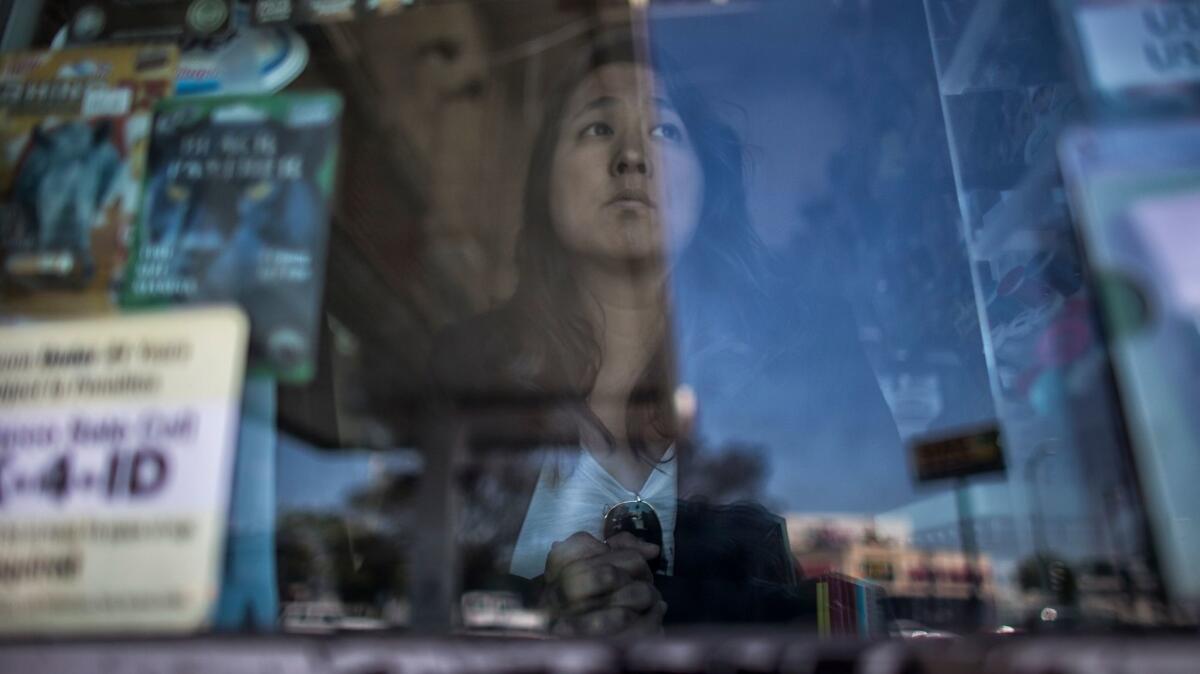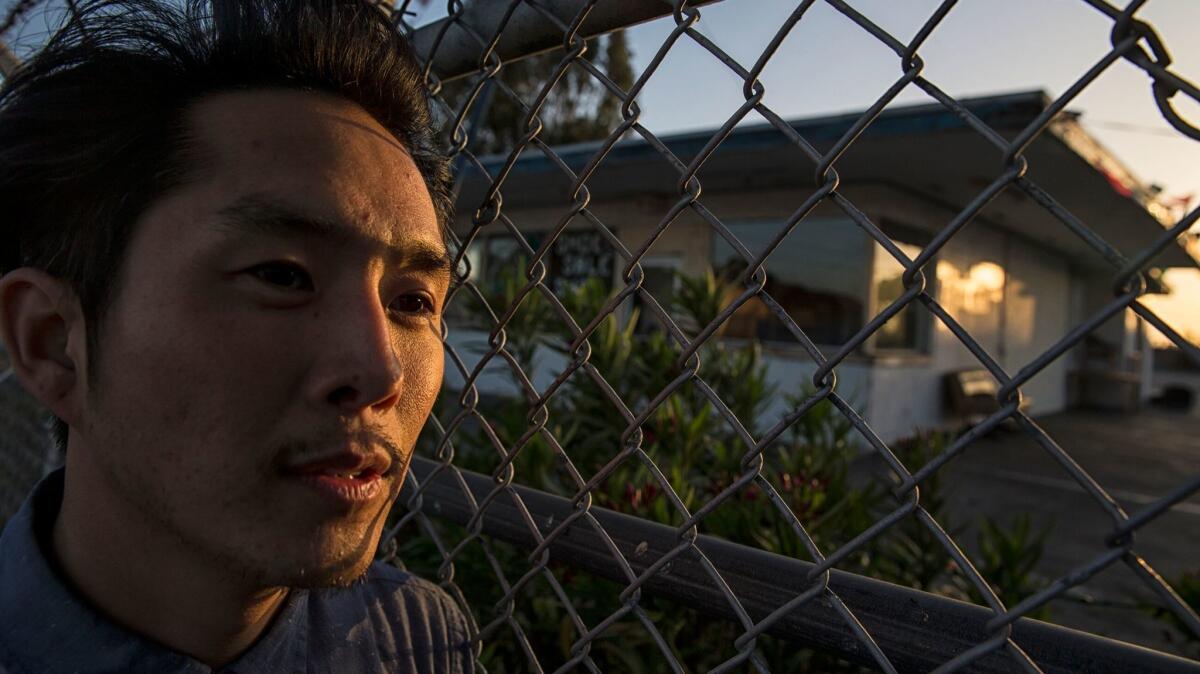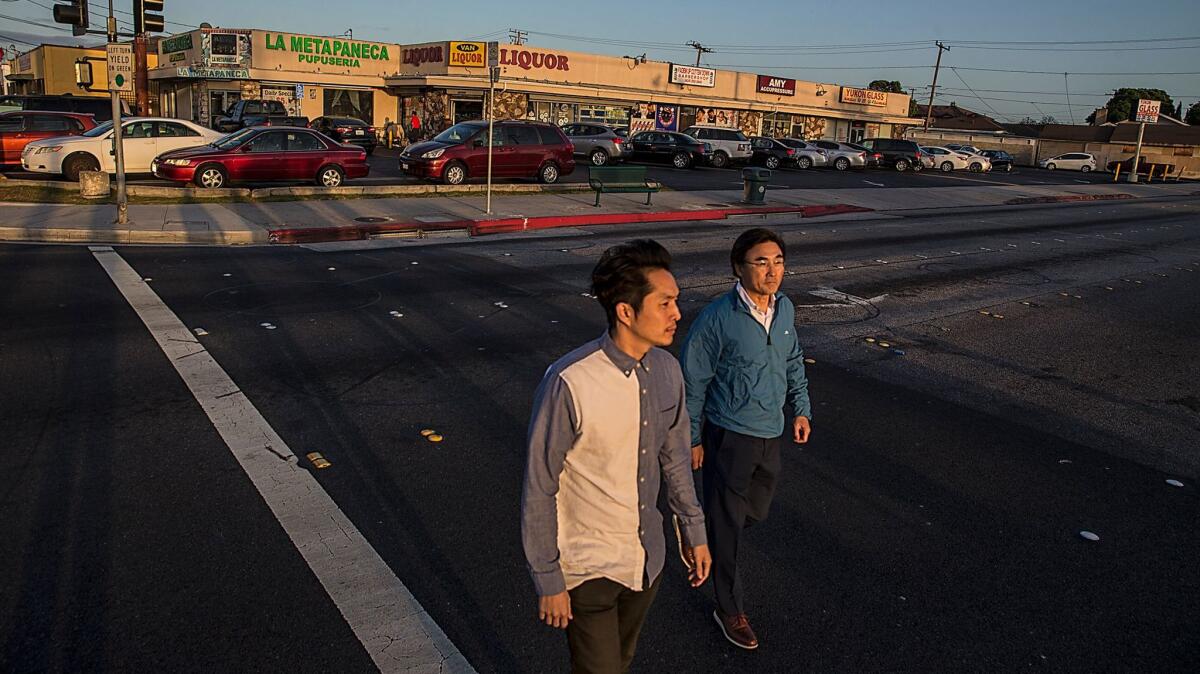They were kids during the L.A. riots. Now two Korean Americans tell their community’s overlooked story

Carol Park and Justin Chon, both children of Korean American business owners during the 1992 L.A. riots, share their perspectives on what the riots meant to them as kids — and now as adults. Video by Jessica Q. Chen
Justin Chon was 10.
It was April 29, 1992. On television, the city was burning, and his father didn’t come home from his Paramount shoe store for a few nights. The boy put two and two together, and he and his sister whispered about what it all might mean for their family.
A month later, Justin stopped by the store. The violence had arrived on the last day of the uprising. The store was still littered with debris and empty, trampled shoe boxes — “like a tornado hit it.” He opened a desk drawer in his father’s office and saw a handgun. They never spoke about it.
Carol Park was 12.
For two years she had worked weekends and summers in the bulletproof glass booth at her family’s gas station in Compton. On the day rioters began to turn that part of town upside down, she and her two brothers called their mother, begging her to leave.
When her mother finally got home in the late evening, she told the kids to do their homework and calmly fixed herself a dinner of cold leftovers. She made no mention of her harrowing escape from the station, or how she had quietly dodged the agitated crowd gathered under the gas price sign — wielding bats, throwing cans and yelling at passing cars.
They were children then, confused and scared, unsure of why their parents and all they had worked for had become targets of so much rage, or why they heard little to nothing of their Korean friends and neighbors’ experience of the riots in the ensuing years.
On the day rioters began to turn that part of town upside down, she and her two brothers called their mother, begging her to leave.
Their parents picked up and moved on with their lives. There was no time to dwell on the hurt.
In the quarter-century since, the children of the thousands of Korean Americans whose businesses were looted, trashed or burned down in the riots have grown into adulthood.
Now, some of them are taking the story into their own hands.
Chon, a budding filmmaker and actor known for his role in the “Twilight” movies, premiered a feature film at Sundance.
Park, a Korean American studies researcher, published a memoir.
Each offers an unflinching Korean American account of the ’92 riots — stories of their parents and their families they felt had gone untold, unheard.

Six or seven years into his acting career, Chon, by then in his mid-20s, answered casting calls for movies set during the L.A. riots.
One was a Romeo-and-Juliet tale of a black girl and a Korean guy, in which he read the part of the guy’s younger brother. Another was set in a liquor store, where he was asked to improvise with a black man, the two spewing racial invective at one another.
Neither, Chon recalled, felt like it reflected his family’s experience or the Korean American experience of the riots — which Koreans refer to as sa-i-gu, the date it all started: 4-2-9.
None of the projects captured the story of his father, who started out hawking clothes and shoes at swap meets across Southern California and built a thriving wholesale business — where as a boy he’d help out, sweeping the floors and unpacking boxes — only to have it all threatened by a wave of anger in search of a target.
“This is not how it went down,” he thought at the time.
He began dusting off distant memories of the store and the aftermath of the riots, and started bugging his father for stories.
His father, a former Korean marine, was perplexed that his son wanted to unearth painful memories that were long in the past.
But the story brewed in the back of Chon’s mind as he began making short films, teaching himself to write and direct in the process. Then a couple of years ago, he heard about a couple of films in the works timed for the 25th anniversary of the riots, including a Halle Berry-Daniel Craig movie about a romance in South L.A. set to the backdrop of the riots.
News of the project, which wrapped filming in February, immediately triggered charges that it was a “white savior” tale.
“The Korean American experience isn’t going to get told,” he thought. “If I don’t take it upon myself to make even the cheap, cheap iPhone version, we’ll never have an opportunity to tell our side of the story.”
He outlined, then furiously wrote, producing a first draft in a couple of months. He anchored the story around two brothers running their late father’s shoe store in Paramount.
He played the role of Eli, and as his brother, he cast David So, a popular YouTube comedian who himself grew up working at his parents’ beauty supply store in a rough part of Sacramento.
In the role of Kamila, a young black girl from the neighborhood who befriends the brothers and spends a lot of time at the store, he cast Simone Baker, a spunky girl he met at a South L.A. performing arts center, who stood out from the over-rehearsed Nickelodeon, Disney channel-style child actors who tried out for the role.
To play the role of Mr. Kim, a surly liquor store owner who pulls a gun on Kamila with echos of the controversial fatal shooting of 15-year-old Latasha Harlins by a Korean grocer, he turned to his own father, who was a child actor in South Korea in the ’60s and ’70s.
“Gook,” shot in black and white and taking place over the course of a day of the riots, premiered to positive reviews in January at the Sundance Film Festival, where it won the NEXT audience award.
Through the unlikely friendship of Kamila and the brothers, who are resented by others in the neighborhood and accused of overcharging and taking advantage, the film unpacks the tangled web of hurt and anger that has left many black residents and Korean small-business owners, similarly disenfranchised and barely surviving, pitted against one another.
“People are mad,” Kamila remarks in the film, watching plumes of smoke rise in the distance.
“As they should be,” Chon, as Eli, says.

“Gook” was just one of a long list of slurs Park became intimately familiar with as the cashier at her family’s Compton gas station starting at age 10.
She was thrust into the front lines of mounting racial conflict and tension after her father’s death in 1990, leaving her mother to raise three children. It was just what needed to be done.
She knew little about what had caused the animosity directed at her, just feeling rage and hatred piling up inside at far too young an age. Where her mother held it in, politely and apologetically addressing customers, Park developed a sailor’s mouth before she hit her teens.
Anger was what she felt in April 1992 as she watched the television news footage, rapt, wondering if they would be able to get a glimpse of the family’s gas station.
The coverage seemed to show Korean American shopkeepers like her mother only as “gun-toting vigilantes” and “greedy business owners,” the young Park thought.
As a young adult, she would occasionally tell stories about her memories from the gas station to friends.
It was only when she was in her late 20s, working toward a master’s degree in creative writing at UC Riverside, that she realized she’d had a story “coming out of her pores” for years.
“This is what I’m supposed to write,” she thought.
In the two decades since the riots, she and her mother had never spoken about what happened. She asked her mother how she felt about it all.
“Don’t you have any hard feelings about what happened? All that trouble? The looting? The worries? The racism?” she asked.
“It was difficult,” was her mother’s reply.
With time and persistence, her mother started opening up.
She told her that when she realized how serious the situation was on the day of the riots, she and one of her employees stuffed the cash from the day’s earnings into a trash bin, topped it with rubbish, and ducked out of the station.
She recounted how a few days later, wanting to check on the station, she paid a reluctant cab driver extra cash to take her close to Compton, and the driver pulled a sawed-off shotgun from the trunk for the ride, just in case.
His father, a former Korean marine, was perplexed that his son wanted to unearth painful memories that were long in the past.
Rioters had bashed in the metal doors of the station’s service bay and looted tools, but spared the rest of the station. Businesses across the street were less fortunate — a doughnut shop was burnt to a crisp.
“Mom had a lot of sadness.… Sad that people would do that, their conditions would cause that,” Park recalled. Her mother had grown up poor and hungry in post-war South Korea. “She had seen the poverty. She empathized with the community her business was in.”
Park researched newspaper clips and spoke to historians of the riots, finally coming to understand the long history of government neglect and police brutality, drug epidemics and recessions that had plagued the neighborhood long before she or her family set foot in Compton.
As she began writing, she started to grasp just how small and powerless both her customers and her 12-year-old self were in the tinderbox that set the stage for the uprising.
“People were disgruntled, dismayed, and ready to rise up,” she wrote. “I was angry and ignorant of these facts, sitting there in my bulletproof cashier’s booth, wondering why I was a damn gook, and wondering what my Korean face had to do with the price of gas and cigarettes.”
She explored the anger she had felt sitting behind bulletproof glass in that tiny booth. She detailed the first time she used the N-word, after a black man, angry that the pump was too slow, accused her of trying to rip him off.
In the two decades since the riots, she and her mother had never spoken about what happened.
“Comin’ up in the hood, overchargin’ us, taking our jobs!” the man had told her. “Dirty, greedy Korean. Screw you and your chink-ass family.”
“I was so tired of being cussed at. I was tired of being blamed for something I had no control over,” Park wrote. “We cussed at each other like scurvy-ridden sailors, stuck in the middle of nowhere with no one else to blame but each other.”
“Memoir of a Cashier” was published in February by the Young Oak Kim Center for Korean American Studies at UC Riverside. Book agents, readers and even a writing professor told her they were surprised by her story, saying they didn’t realize Korean Americans had figured into what they had remembered as a white-black conflict.
“It was a cathartic experience,” Park said. “I wanted to raise the Korean American voice — this is our story, what had happened to us.”
I was so tired of being cussed at. I was tired of being blamed for something I had no control over.
— Carol Park, author

At the after-party following the Sundance premiere of his film, Justin Chon saw his father approaching him. Maybe he’ll say he’s proud, or even, “Good job,” the younger Chon thought.
“Hey, stop drinking. You already had two beers,” his father said.
Still, Chon said he could tell his father was proud in the way he bounded up to the stage after the film was over, when he had previously told him he didn’t want to be publicly acknowledged.
Sang Chon said in an interview that he was surprised and impressed by the details his son had remembered and re-created from stories he had told in passing, creating a film that felt realistic.
He said it brought back old memories. He recounted how, during the riots, he briefly returned home for a change of clothes.
Exiting the freeway, he drove past a golf course where he saw people peacefully enjoying their day while elsewhere, the city was under siege.
“I thought then, to them, it’s someone else’s business. To them, it doesn’t hit home,” Sang Chon said in Korean.
Park’s mother’s health has been failing along with her eyesight, making it difficult for her to read her daughter’s memoir. She had vigorously protested against the publication of her photo — Park went ahead with it anyway — but she nevertheless seemed happy and proud when her daughter showed her the book, Park said.
Whenever she brought up the riots, her mother would grow silent with a distant look in her eyes. But she never held any anger or resentment, Park wrote in the memoir.
“I’m just glad we’re all OK,” she would say. “That’s all in the past.”

For more California news, follow me on Twitter @vicjkim
ALSO
Steve Lopez: 25 years after riots, South L.A. still waiting for its renaissance
Filmmaker John Singleton on L.A.’s fragile progress since the 1992 riots
More to Read
Sign up for Essential California
The most important California stories and recommendations in your inbox every morning.
You may occasionally receive promotional content from the Los Angeles Times.











